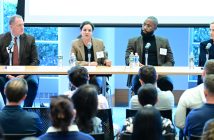Fordham Law grads are filling high-profile positions thanks to their affiliation with the Center on National Security.
While the terrorist attacks in Paris and San Bernardino, California, last fall vaulted national security to a top slot among the worries of United States citizens, more than a quarter of the Obama administration’s most senior jobs remain unfilled, especially in foreign affairs and national security.
In a recent Wall Street Journal/NBC News poll, 40 percent of Americans say that national security and terrorism were top priorities for the federal government, marking an increase in 19 points from the last time the public answered the same question in April 2015. However, as President Obama commences his final year in the White House, aides and senior officials are decamping for private-sector positions, leaving gaps for new talent.
Karen Greenberg, the Director of Fordham’s Center on National Security, points out that now is the time for newly minted Fordham Law graduates to be Beltway-bound as terrorism prosecutions in the United States rise, national security facts in election debates remain slippery, and globalism produces a new range of threats—and opportunities to dismantle them.
“The profession of post-9/11 national security law is still evolving, still catching up with the demand unleashed by the current era’s twin threats of terrorism and cyber attacks,” she said.
Greenberg seems to have an uncanny knack for selecting and supporting students who will eventually make good candidates for positions in the nation’s capital.
“It takes a while to know the students, to get a sense of talents; it’s a field in and of itself,” she said. “I look for a combination of intelligence, thoughtfulness, and maturity. The people who ultimately take security-related jobs exist within a tense political atmosphere, so they need to have the ability to step back and reflect on things—from a legal perspective and outside the fray.”
At the Center, Greenberg’s students help her with a range of responsibilities: from updating the terrorism trial database and helping to write the daily newsletter to preparing symposia. This past year, three of them have landed positions related to the work they did for Greenberg.
“The demand suggests that there is currently ample opportunity for those that are highly qualified to enter the profession and eventually to attain some of the country’s top positions,” Greenberg said.
Jacqueline Barkett
Trial Attorney at U.S. Department of Justice, National Security Division, Counterterrorism Section
Jacqueline Barkett wasn’t always certain she wanted to go to law school. However, after obtaining a master’s in international relations from the University of Southern California and working in two policy positions in Lebanon (at the U.S. Embassy, and with the Carnegie Middle East Center) she realized that “every human rights issue had a legal component.”
Once she decided on Fordham, she sought out Greenberg and found that her class exposed her to all the players involved in a given national security situation—the courts, the politicians, the intelligence community, and the press—and the angles at which they examined it.
“Karen mentored me by making sure I knew every side, could provoke good conversation, and understood the full expanse of everything,” Barkett said from her office in D.C.
During her three years at Fordham, Barkett worked as an intern for the U.S. attorney’s office in both the Southern and Eastern Districts of New York and then with the National Security Division of the Justice Department in the summer of 2014, before signing on full time last September.
The Counterterrorism Division has a unique role in that it advises and assists all the U.S. attorney’s offices across the country, in order to establish a universal standard and strategy, according to Barkett. Until she settles into her permanent role, she will serve for the next seven months as a special assistant U.S. attorney to learn the ropes of trial practice at the D.C. U.S. attorney’s office.
“Sure, we prosecute, but I’m most impressed by the DoJ’s decision not to prosecute,” she said. “It’s a much more deliberative process than the public knows.”
Kevin Garnett
Researcher, Serial
When representatives of public radio personalities Sarah Koenig and Ira Glass called Greenberg one afternoon looking for a new researcher to help them with the second season of Serial, a spinoff of the award-winning This American Life and one of the most popular podcasts ever produced, she knew just whom to send: Kevin Garnett, a former journalist and her outgoing Dean’s Fellow at the Center on National Security.
Garnett, who came from a magazine and human rights background, began working at the Center following his graduation from the Law School in 2013. Among other duties, he assisted Greenberg with investigating her forthcoming book, Rogue Justice: The Making of the Security State (May 2016).
“After graduating from Fordham, Karen was a big help as I decided to transition out of traditional legal work,” Garnett said between episodes of Season 2, which follows the story of Bowe Bergdahl, the American soldier who left his Afghanistan base in 2009, was captured by the Taliban, and became the focus of a controversial POW swap in May 2014.
“If Sarah is going to interview someone who has written a lot in the media or an expert on a particular aspect of the story, I will write a brief for her and start the process,” Garnett explained. “There’s a call for people who have an understanding of the law to help explain legal issues to people for whom the law seems intimidating—to demystify and untangle these issues.”
Joseph Attias
U.S. Department of Justice, National Security Division, Counterterrorism Section
Joseph Attias grew up fascinated by the problem of terrorism, an interest he couldn’t quite explain until his first Fordham Law class with Greenberg. Almost as soon as he was introduced to Terrorism and Law in the 21st Century, Attias immersed himself in 2339B statutes (involving material support to terrorism), laws related to the Classified Information Procedure Act, and FOIA precepts.
“Karen exposed us to so much,” Attias said. “We were also able to listen to, and even speak with, people I would have never otherwise been in the same room with. She seems to know everybody.”
Attias first interned with the Terrorism and International Narcotics unit at the U.S. Attorney’s Office for the Southern District of New York, a new division that investigates and prosecutes transnational acts of terrorism, narco-terrorism, narcotics trafficking, and money laundering. Then last summer, Attias interned in the Counterterrorism Section of the Department of Justice.
“I loved it. I had dreamed about working in the FBI or the DoJ since I was a kid,” he said. “Once you’ve gone to law school and retain the interest in national security, this is a very natural direction. Karen has been extremely helpful in this process from when I first met her.”
–Adrian Brune




